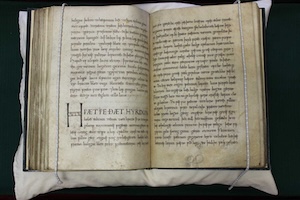"Deor" is an Old English lament from the c.10th century Exeter Book (pictured), the largest surviving collection of Anglo-Saxon poetry. The title of the poem does not exist in the manuscript; modern editors have given it that title, because the poem ends with the author naming himself.
The author (or the character created by a poet) was a poet and faithful retainer of a lord, but he has been replaced in the lord's favor with another poet. He reflects on his fate by writing about many others in the past who suffered defeats or tragedy. Each stanza ends with the stoic reflection that, since the mentioned calamity ultimately passed, his personal tragedy and sadness may also pass. The line in Old English is þæs ofereode, þisses swa mæg, which can translate simply to "that passed, this also may." If you recall that the letter þ=th, and æ=flat or short a, you could reliably pronounce the whole phrase yourself and see its connection to Modern English.
Because the poet refers to events of the past, the poem reinforces some legends we find in other sources. The opening stanzas cover Wayland and Böðvildr. Here they are, translated/interpreted by the poet Michael Burch:
Weland endured the agony of exile:The final stanza explains the narrator's plight:
an indomitable smith wracked by grief.
He suffered countless sorrows;
indeed, such sorrows were his bosom companions
in that frozen island dungeon
where Nithad fettered him:
so many strong-but-supple sinew-bands
binding the better man.
That passed away; this also may.
Beadohild mourned her brothers' deaths,
bemoaning also her own sad state
once she discovered herself with child.
She knew nothing good could ever come of it.
That passed away; this also may.
If a man sits long enough, sorrowful and anxious,
bereft of joy, his mind constantly darkening,
soon it seems to him that his troubles are limitless.
Then he must consider that the wise Lord
often moves through the earth
granting some men honor, glory and fame,
but others only shame and hardship.
This I can say for myself:
that for awhile I was the Heodeninga's scop,
dear to my lord. My name was Deor.
For many winters I held a fine office,
faithfully serving a just king. But now Heorrenda
a man skilful in songs, has received the estate
the protector of warriors had promised me.
That passed away; this also may.
This notion of "this too shall pass" is an old one, one would think. The fact that it is found so eloquently in the Exeter Book would make you think that this is where it entered into the English language. In fact, Western Civilization got it from another part of the world, and we'll talk about that tomorrow.
